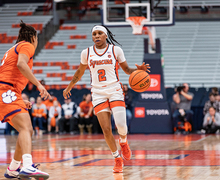Joel White’s career is still going 10 years after 2 titles with Syracuse
Daily Orange File Photo
Joel White was a two-time Tewaaraton finalist during his time at Syracuse

Joel White found himself with a chunk of plastic in his hands on a field in Netanya, Israel, with a USA logo brandished on his chest. It was June 2018 and White couldn’t believe it. Lacrosse — the sport that carried him from Cortland, to the Carrier Dome, to across the continental United States — had now brought him to the Middle East.
Earlier that month, during the heat of the 2018 World Lacrosse Championship, White sat with teammates on plastic lawn chairs after practices and bonded. White had previously admitted it was “probably his last go” playing at the international level. After toppling the Canadian National Team, 9-8, on July 21, White returned home to Nashville, Tennessee, with “relationships that’ll last for life,” and pondered the future.
“It’s hard to do, it’s not easy,” White said. “When it’s not fun, it starts to wear on you. You start to decrease your work ethic and it shows on the field. It’s always been my mindset is that I need to be where I need to be.”
At 30 years old, he had reached the latter portion of his career and the thought of life without the sport had crept to the foreground. But while one section of his playing days were over, a few months later, another one recently started. In March, White announced that he had signed with Chrome Lacrosse Club of the Premier Lacrosse League, a new start-up that utilizes a touring-based model to generate wider support for the game. The PLL Chrome could be one of the last stops on White’s lacrosse journey.
Eleven years ago, White stepped on Syracuse’s campus and etched his name in lore. He graduated as SU’s all-time leader in ground balls (283) and goals by a defensive player (18). The awards followed through 60 wins: Three-time All-American defensive midfielder and two-time Tewaaraton Award Finalist. In 2009, he helped the Orange to their second-straight national title months after winning a gold medal as a 19-year-old.

Anna Henderson | Digital Design Editor
White operated under the mantra that if he could get one workout in per day, he’d be a better person for it. It drove him in the morning for extra-shooting sessions and team workouts. As his career progressed, White maximized his passion and sought opportunities to grow the game. That’s why his Team USA run left him “rejuvenated.” He still is.
“That’s been my mindset as I’ve gotten older,” White said. “Once the passion and the fun kind of bleeds out of me, it’s time to hang up the cleats. I still have that fire, I still have that passion to play.”
White started lacrosse down Interstate 81 at Cortland High School and soon was recognized not for the elite defender he would become, but as a scoring threat. He totaled more than 100 points in his senior year (55 goals, 48 assists) and displayed the ability to handle one-on-one matchups time and time again. But when he got to Syracuse, assistant coach Lelan Rogers “had a plan,” White said.
The Orange, coming off a five-win season, featured a litany of scorers. White had a choice: He could either claw for reps and minutes against veterans or switch roles and be a long-stick midfielder on the first line. Coaches handed White a long-pole and directed him to be a defensive force. White’s athleticism translated, and he soon led the team in ground balls. He eventually earned No. 11, typically given to SU’s best-stopper.
After graduation, White settled into the routine of a professional player in a non-big-four sport. He was the second overall pick in the 2011 Major Lacrosse League draft by the Rochester Rattlers. A year later, he was selected 10th overall in the indoor National Lacrosse League draft. He made All-Star teams and won awards with a few different teams. But, with the routine came his “9 to 5” job because “(lacrosse) isn’t paying the bills, yet.”
When White heard Mike Rabil, the PLL’s co-founder, present his vision for the promise of a new league, White again saw an opportunity. He saw a chance to build a foundation. He saw the next step in the sport’s, and his own, development.
“Whether it’s waking up earlier or staying up late,” White said, “or doing the lacrosse things at lunch, it’s making sure you have the time.”
Published on April 17, 2019 at 12:33 am
Contact Nick: [email protected] | @nick_a_alvarez




